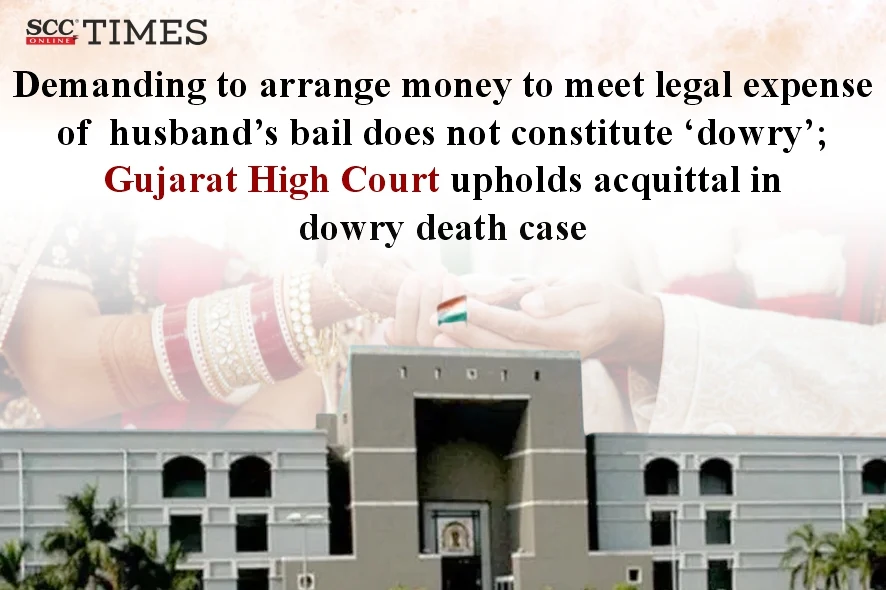Gujarat High Court: In a criminal appeal filed against the judgment dated 6-7-2013 passed by the trial court, whereby the accused persons were acquitted of the charges under Sections 304(B), 306, 498(A) and 114 of the Penal Code, 1860 (IPC), the Division Bench of Cheekati Manavendranath Roy* and D. M. Vyas, JJ, upheld the trial court order and stated that a demand made to the wife to arrange for money to meet the legal expenses for applying bail of the husband does not amount to ‘dowry’ under Section 2 of the Dowry Prohibition Act, 1961.
Background
The deceased wife and her husband had been married for 6 months when a criminal case was filed against the accused persons, i.e., her husband, her father-in-law and her brother-in-law for fabrication of documents regarding a land transaction with a third party. The wife’s parents (prosecution) claimed that the wife’s father-in-law had directed the other accused persons to pressurize the wife to arrange Rs 50,000 from her father to meet the legal expenses for obtaining bail for her husband and Accused 1 and 4.
According to the prosecution, the wife’s father arranged for Rs 10,000 but the accused kept harassing the wife for the remaining amount and when she was unable to bear the harassment any longer, the wife consumed poison and committed suicide.
The accused were charged under Sections 304(B), 306, 498(A) and 114 of the IPC, but the trial court acquitted the accused of all charges on the ground that the prosecution had failed to prove the case against the accused beyond all reasonable doubt.
The instant petition was filed as an appeal against the trial court’s judgment.
Analysis, Law and Decision
The Court observed that one of the requirements under Section 304(B) of the IPC was that the person must have died under unnatural circumstances. Even though the prosecution had claimed that the wife died due to consumption of poison, there was no medical evidence on the record to definitively prove that the wife had consumed poison. The Court held that the prosecution had miserably failed to prove that the death of the wife was due to consumption of poison.
The Court further observed that in accordance with Section 304(B) of the IPC, harassment must be meted out within a period of 7 years of marriage in connection with any demand for dowry. The Court also referred to Section 2 of the Dowry Prohibition Act, 1961 which defined dowry as any demand made for money or any valuable security in connection with marriage either before, or at the time of or even after marriage. In the instant case, the accused made a demand of Rs 50,000 to apply for bail of the husband. The Court opined that such a demand could not be considered as ‘dowry’ and therefore, it could not be said that the wife had been harassed to meet an illegal demand for dowry which led her to consume poison and commit suicide.
Additionally, the Court looked at the bank statements of the accused persons and noted that the accused had around Rs 2 lakhs to Rs 3 lakhs in their account at the time of arrest. Clearly, the accused had sufficient funds to arrange bail and therefore, it seemed doubtful that they would’ve harassed the wife for Rs 50,000.
The Court went on to state that the prosecution had failed to establish a case under Section 306 of the IPC as well. To prove an offence of abetment of suicide under Section 306 of the IPC, the prerequisites under Section 107 of the IPC which relate to instigating or aiding the deceased in committing suicide, must be proved. The Court observed that there was no reason to believe that any of the accused had instigated the wife either directly or indirectly, to commit suicide and therefore no case under Section 306 of the IPC could be made as well.
Upon re-appraisal of the evidence on record, the Court held that the prosecution had failed to prove the charges levelled against the accused beyond all reasonable doubt. Thereafter, the Court upheld the order of acquittal passed by the trial court and dismissed the instant appeal.
[State of Gujarat v. Natubhai Golanbhai Khuman, 2025 SCC OnLine Guj 2265, decided on 26-6-2025]
Order by: Justice Cheekati Manavendranath Roy
Advocates who appeared in this case :
For the Appellant: Bhargav Pandya (APP)
For the Respondent: Pavan Barot, Advocate



